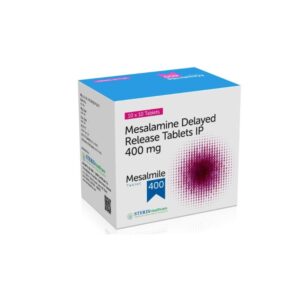MESALAZINE
MESALAZINE: Mesalazine, also known as mesalamine, is a medication that is primarily used to treat inflammatory bowel disease (IBD), including ulcerative colitis and Crohn’s disease. It is classified as an anti-inflammatory drug and falls under the category of aminosalicylates.
The exact mechanism of action of mesalazine is not fully understood, but it is thought to work locally in the intestines. It has anti-inflammatory effects by reducing the production of pro-inflammatory chemicals, particularly the production of prostaglandins and leukotrienes. Additionally, mesalazine may help to normalize the immune response in the intestines, reducing inflammation further.
The dose of mesalazine can vary depending on the indication and severity of the disease. It is available in different formulations, including oral tablets, delayed-release tablets, capsules, enemas, and rectal suppositories. The dosage may range from 800 mg to 4.8 g per day, and it is usual to take it in divided doses throughout the day.
Common side effects of mesalazine may include nausea, vomiting, abdominal pain, diarrhea, headache, skin rash, and fever. These side effects are usually mild and transient. Serious side effects are rare but can include severe allergic reactions, pancreatitis, liver problems, and kidney problems. It is important to discuss any concerns or changes in symptoms with a healthcare professional.
Mesalazine is generally considered safe for use in pregnancy, but it is advisable to consult with a healthcare provider before starting or continuing the medication. Additionally, individuals with a known hypersensitivity to salicylates or mesalazine should avoid taking this drug.
It is crucial to follow the prescribed dosage and duration of treatment as advised by a healthcare professional. Regular monitoring and follow-up visits are essential to assess the response to treatment and evaluate potential side effects.






